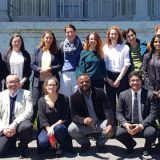In June 2019 Prof Kieran McEvoy gave the plenary address entitled ‘Apologies, Reparations and Non-State Armed Groups’ at the Geneva Reparations Week Conference in Geneva Switzerland. The address discussed what role apologies by non-state armed groups can play in providing symbolic reparations to victims in societies recovering from violent conflict.
In an expert meeting organized at the Geneva Academy by the School of Law at Queen’s University Belfast, more than 30 academics and practitioners from a range of backgrounds and institutions from around the world discussed reparations by non-state armed groups during and following armed conflicts.
‘This meeting aimed at sharing our preliminary findings on reparations and non-state armed groups from fieldwork in Uganda, Peru, Colombia, Northern Ireland, Nepal, South Sudan and Guatemala’ explains Luke Moffett, Senior Lecturer at Queen’s University Belfast.
‘It was our pleasure to run our workshop in the historic Villa Moynier, which provided the conducive space to work with the academics of the Geneva Academy and others on this significant but sensitive issue’ he adds.
A KEY TRANSITIONAL JUSTICE ISSUE
Participants discussed how reparations by non-state armed groups might operate in practice during and following a conflict, what role apologies by non-state armed groups can play in providing symbolic reparations to victims, as well as the issue of humanising combatants, including their social reintegration.
‘As most armed conflicts are, today, non-international armed conflicts involving armed groups, the questions of reparations by these actors is a major issue for transitional justice’ underlines Frank Haldemann, Co-Director of our MAS in Transitional Justice, Human Rights and the Rule of Law (MTJ).
‘The research project addresses a largely neglected topic of central practical relevance, challenging many current assumptions in the field, and is therefore welcomed’, adds Thomas Unger, Co-Director of our MTJ.

A HANDBOOK FOR HUMANITARIANS
The research team at Queen’s University Belfast will build on these discussions and their research to produce in early 2020 a handbook for humanitarian organizations to engage non-state armed groups on reparations.
